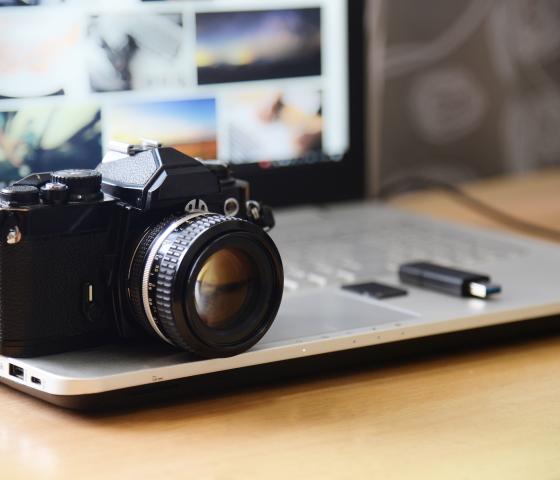Digital Photography - Beginners' Workshop Course
Get the most out of your digital camera and unleash your creative potential by discovering how your camera really works!

Overview
Campus Bunbury
When All year round
Study Mode On Campus
Learn the fundamentals and advantages of using manual modes and controlling shutter speed, aperture and ISO, so you can progress to the next level of creative photography.
This course offers a blend of helpful theory in easy-to-understand terms, clear demonstrations and student practicals, so you can learn how to put the theory into practice in a fun and supportive environment.
Aimed at those who have the vision but don’t know how to use their camera to get there, this course will guide you towards gaining new skills and confidence to action that vision.
Course notes are included.
Topics covered in this course include:
• Getting to know your DSLR camera and how it works
• How to control the camera using manual modes, shutter speed, aperture and ISO controls
• Focusing
• Using your camera's light meter
• Understanding exposure
• Choosing the right lens for the job
• File formats – convenience versus quality
• Qualities of light, how and when to use it
• Composition
• Editing in camera & on computer
• Photography genres - finding your own style
• Reviewing your work and learning from feedback
• Storing your files
This is a non-accredited short course.
- You want to learn how to use a digital camera.
- You want to unlock your creativity and the power of visual storytelling through digital photography.
Then this is the course for you.
To make an informed choice about the suitability of this course, please consider the essential skills and knowledge below. You must:
- Express an interest in creative expression and the Creative Industries.
- Demonstrate good working knowledge of computers.
- Be familiar with your camera’s manual.
- Have good hand-eye coordination.
- Have steady hands.
- Demonstrate basic technical skills.
- Show good observational skills.
- Display adaptability and experimentation.
This course is designed for beginners who have a vision but are unsure how to use a digital camera. This course builds skills and confidence to bring that vision to life. It offers a blend of theory, demonstrations and student practicals, so you can learn how to put the theory into practice in a fun and supportive environment.
This course will provide you with the fundamentals and advantages of using manual modes and controlling shutter speed, aperture and ISO, so you can progress to the next level of creative photography.
Time Commitment – You will need to allocate appropriate time to complete this course. This includes attending classes on-site and/or online as outlined in the study mode; and undertake independent study outside of class hours, including private study, assessment preparation, research and complete assessment requirements.
Below are some of the important personal skills you will be required to develop and demonstrate during training. These skills are highly valued by industry:
- Respectful Communication - Interact with people from different backgrounds, share ideas effectively and build trust.
- Teamwork – Collaborate with others, show them respect, and be open to feedback.
- Problem Solving - There is always a solution. How do you respond to a challenge? If you spot a problem, we encourage you to ask questions, clarify as needed, and respond appropriately within your training.
- Initiative - Stay motivated, take proactive steps, and seek help when necessary.
- Planning - Manage time well. Knowing how to prioritise and completing your tasks efficiently are crucial for your success.
- Self-Management - Reflect on your performance. Reflection is a powerful tool for growth and success as a student at South Regional TAFE. Being a professional in the workplace can mean learning when to accept responsibility for your failures as often as your successes. This is how we learn!
- Learning – Recognise what your strengths already are. Then embrace all the new knowledge and experience from your South Regional TAFE journey to grow as a student. Some of the skills you will learn include:
- Getting to know your DSLR camera and how it works
- How to control the camera using manual modes, shutter speed, aperture and ISO controls
- Focusing
- Using your camera's light meter
- Understanding exposure
- Choosing the right lens for the job
- File formats – convenience versus quality
- Qualities of light, how and when to use it
- Composition
- Editing in camera & on computer
- Photography genres - finding your own style
- Reviewing your work and learning from feedback
- Storing your files
- Technology - Adapt to new tools, access digital resources, and integrate technology into your learning.
Select your preferred campus and apply
All year round, 2025
Details
Units
Core
| National ID | Unit title |
|---|---|
| A1013 | Digital Photography - Beginners |